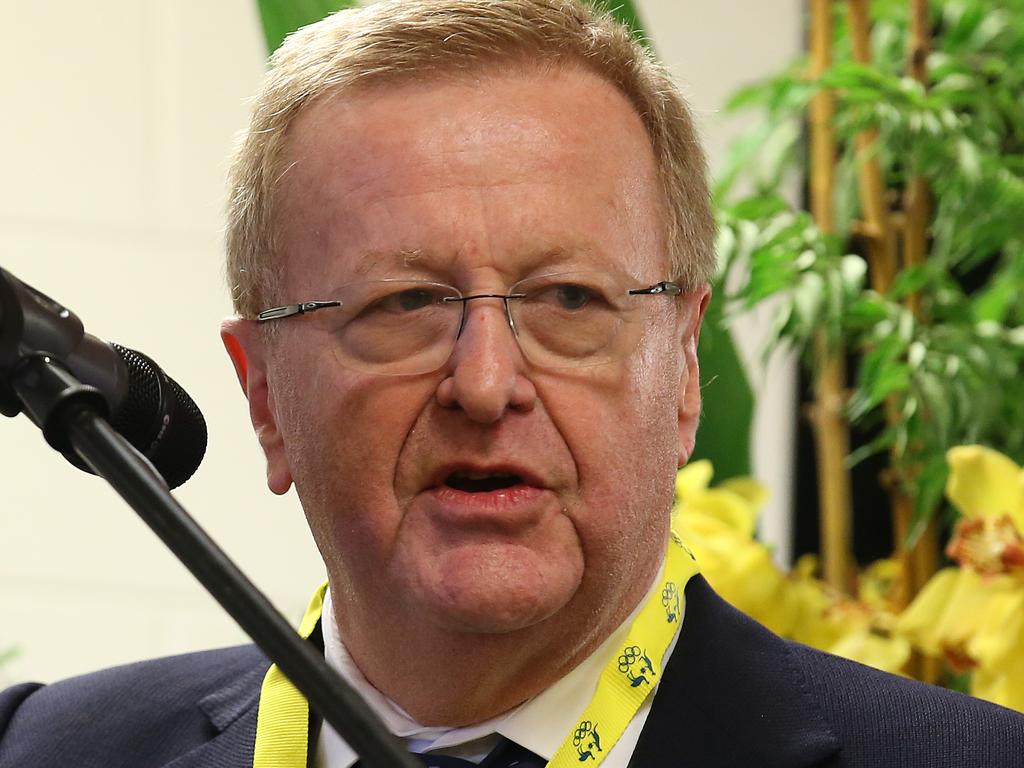Coronavirus: Can the Olympics really go ahead?
As a fourth wave of pandemic grips Japan, Olympics hosts insist their plans are on track. It’s a high stakes battle in the face of an absence of vaccines and an increasingly hostile public.
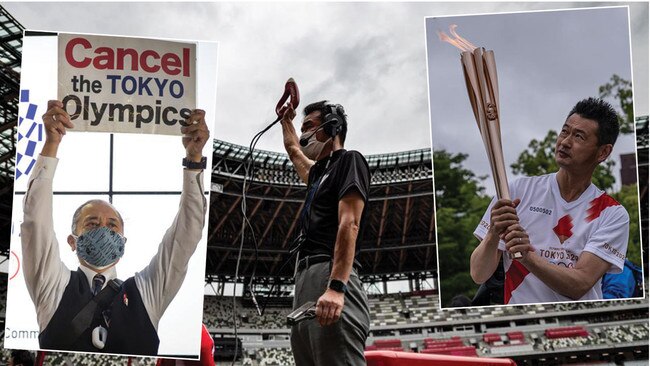
The Olympics are happening — that, at least, is the assertion of the Japanese hosts and the Games organisers. But can they? In a country battling a fourth wave with an absence of vaccines and an increasingly hostile public?
The stakes are huge — the careers of top-level athletes and national politicians are on the line, as well as tens of billions of dollars.
The judgments, though, are different for those most closely involved. On one side is the International Olympic Committee (IOC) fighting to save the event that is its sole reason for existing; on the other, a Japanese government struggling to reconcile its huge investment of money and prestige with rising infections and the anxious resistance of its public.
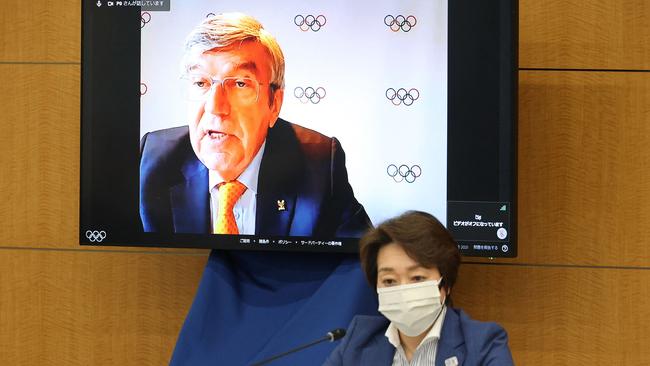
Publicly, Japanese and Olympic officials are insisting that despite the ravages of the global coronavirus pandemic the Games will be safe and that no one needs to worry.
“Together with our Japanese partners and friends, I can only re-emphasise this full commitment of the IOC to organise safe Olympic and Paralympic Games for everybody,” Thomas Bach, the president of the IOC, said this week. “To accomplish this, we are now fully focused on the delivery of the Olympic Games.”
Cracks in the PR facade
But every now and then, a crack appears in the smooth public relations facade.
This week it came in an interview given to a Japanese news agency by Dick Pound, a former vice-president of the IOC and its longest-serving delegate, who acknowledged that whether the games went ahead was an open question.
“Before the end of June, you really need to know, yes or no,” he told Jiji Press. “There will be no further postponement. They go ahead, or they cancel. If there’s a huge outbreak that is really out of control in Japan and the Japanese public health authorities say it’s too dangerous, we can’t proceed.”
This, then, is the answer to the question that so many people are asking.
Will the Olympics go ahead on July 23? Nobody knows yet. What is clear is that the situation is becoming more and more difficult and that pressure on the Japanese government to cancel is increasing by the day.
For months, polls have shown that the Japanese public is vehemently opposed. In one of the most recent, 83 per cent of residents were against the Games happening as planned.
Japan has had a better pandemic than western countries, but its fourth wave of infection continues. Daily cases have risen from just over 1,000 on March 1 to just under 7,000 on May 13, even though a state of emergency in the big cities seems to be causing the rate to plateau.
Deaths, however, have been increasing for six weeks to about 100 a day, as the health systems in some cites is overwhelmed. In the city of Osaka, at least 18 people have died in their homes because hospital beds could not be found for them.
What has more recently become clear is the drastic disjunction between Japan’s administration of vaccines and that of many of the countries that will be sending athletes to Tokyo. Late approvals, bureaucratic inertia and an insistence that only doctors and nurses can administer injections mean that only 4 per cent of people have had at least one jab. Even among medical staff, only two out of five have received two jabs.
The government plans to offer injections to some of its athletes, but come July the bus drivers, canteen staff, guides and volunteers who interact with the tens of thousands of athletes, journalists, technicians and hangers-on will be protected by nothing more than face masks and sanitiser.
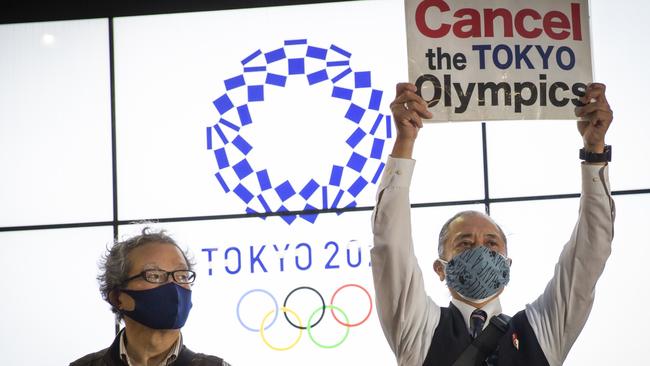
Day by day there are more and more public demands for cancellation, from individuals on social media to business and professional organisations.
“Our nation is now undergoing a surge in coronavirus patients in a fourth wave, the worst so far,” the Tokyo Medical Practitioners Association wrote in a letter to the prime minister, Yoshihide Suga.
Medical system stretched thin
“The medical systems responding to COVID-19 are stretched thin, almost to their limits. The reality is that the entire medical system faces an almost insurmountable hardship in trying our best to respond with coronavirus measures. The correct choice is to the cancel an event that has the possibility of increasing the numbers of infected people and deaths.”
Dozens of Japanese towns have withdrawn their offers to host international teams.
In respect of cancellation, the contract between the IOC and Tokyo is straightforward: only the committee can make the decision, for reasons of war or civil disorder, or “if the IOC has reasonable grounds to believe, in its sole discretion, that the safety of participants in the Games would be seriously threatened or jeopardised for any reason whatsoever”.
In reality, though, the balance of power lies with Japan: the Games cannot go ahead without its active and fulsome support. It would be unthinkable for Bach to insist on holding a games if Suga said that he did into want it.
High cost of cancelling
Japan, in any case, controls the entry of people and goods into its own territory. No one wants to be the one to pull the Olympics plug for the first time outside a world war (the only previous cancellations have been 1916, 1940 and 1944). But the question is not so much who would decide as who would pay for the catastrophe of a cancelled games.
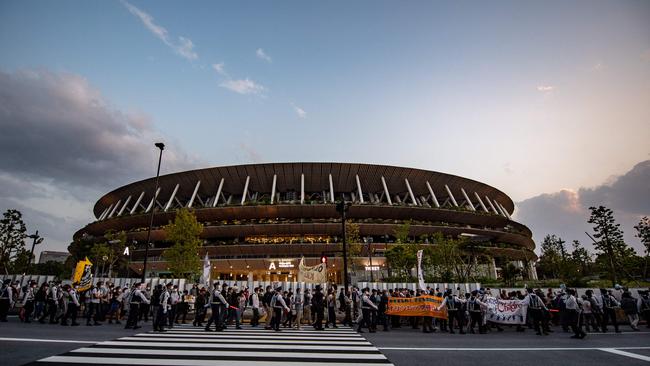
A study by Oxford University concluded last year that Tokyo’s would be the most expensive Olympic Games ever staged — even government audits, which are likely to be conservative, put the cost to Japan at $US 25 billion or more, much of which has already been spent on stadiums and on the cost of postponement from last summer. The IOC would lose an estimated $US1.5 billion in broadcasting fees.
Everyone has insurance, although it would not cover everything. If Japan made the decision to cancel, it would certainly face demands for compensation. How large and punitive these would be would be a matter for careful calculation for the IOC: in the new world of pandemics, it will not want to scare off other potential hosts from bidding for future Olympics.
Various options remain, short of outright cancellation. It has already been decided that foreign spectators from outside Japan will not be admitted.
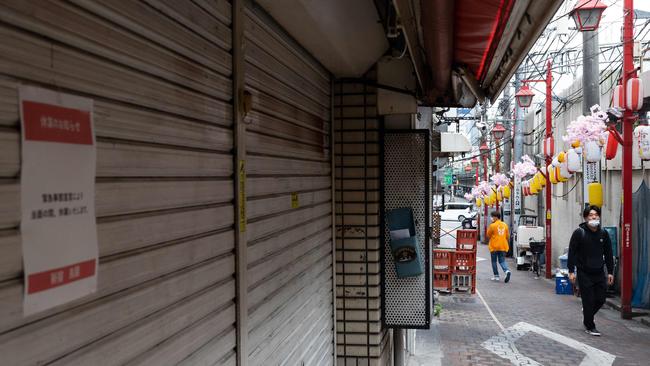
The question is whether even locals will be allowed to watch. This decision has repeatedly been put off, but is promised next month.
An Olympics without spectators might not be all that different for television viewers around the world, who always make up the biggest audience, although the absence of stadium atmosphere and laps of honour would make for a flat living-room experience.
But the loss of ticket sales, as a well as the spending from domestic and foreign tourists, would deprive Japan of one of its few remaining streams of Olympic income.
As the loquacious Pound made clear, it is still possible that the whole thing will be called off. If it is, there is likely to be no warning. To have any chance of pulling off the Olympics, especially in such fraught circumstances, their organisers need to exude an aura of impregnable optimism. Apart from anything else, this is for the sake of athletes, whose relentlessly demanding training programs depend on psychological as well as physical fitness.
Displays of unfaltering confidence are no guarantee that the Games will go ahead. Last year’s postponement was ruled out until the moment it was announced. If the Tokyo Olympics do fall victim to the pandemic, it is likely to happen late, without warning and at a stroke.
The Times


